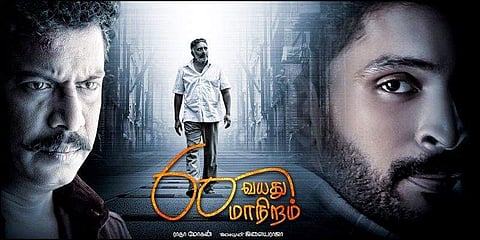60 Vayadu Maaniram Review: A well-meaning remake, despite the soap-opera approach
How much you take to Radha Mohan's latest film, 60 Vayadu Maaniram, depends a lot on your tolerance for well-intentioned earnestness approached with the sensibilities of a glorified soap opera. But then, it's not like you walk into a Radhamohan movie and expect to be treated to layered, minimalistic, avant-garde fare. With this filmmaker, you know what you've signed up for. Happy things happen; sad things happen. Anticipatory tension is conveyed through a series of close-ups and zoom-ins; cue - suspenseful music. But his intentions are clear. He isn't making cinema merely to entertain; he wants to make the world a better place. Given this, 60 Vayadu Maaniram, a remake of the Kannada hit, Godhi Banna Sadharana Mykattu, is one of his better films - not as brilliant as Mozhi, but certainly not amateurish like Brindhavanam.
This old-fashioned coming-of-age film, about a career-minded narcissist realising the value of relationships, stays faithful to the original for the most part. Both the parent and the child getting lost - one literally and the other figuratively - and in the process, discovering each other, naturally lends itself to quite some endearing moments. But, even when adapting existing material, Radhamohan proves he's a better writer than director in that the heartwarming script never really transforms into the film it deserves to be. There’s always a beat missing. There’s always some dead air. A feeling of having walked into a stage play that takes itself a little too seriously.
Direction: Radhamohan
Cast: Vikram Prabhu, Prakashraj, Indhuja, Samuthirakani
You sense this the most in the sequence that establishes the conflict. The son loses his Alzheimers-afflicted father on the road because of his apparent negligence. The father, essentially a man-child because of his condition, wanders the streets like a vagabond; cue - philosophical song. The son goes on a guilt trip. Radhamohan attempts to invoke quite a variety of emotions, but his attempts are invariably devoid of finesse. While this issue doesn't affect the father's journey much thanks to the performances of actors like Prakashraj, Samuthirakani and Elango Kumaravel, it plagues the entirety of the son's arc. Take the sequence where Vikram Prabhu, playing the remorseful son, breaks down in front of his father's doctor. Or the scene where a well-meaning hitman contemplates killing the old man for his own safety. We can practically hear the script being read out to us. In other words, what we’re witnessing, is the screenplay. Where's the direction?
Another problem is the convenient portrayal of the changing dynamics in the character's relationships. In the original, when the son realises the gravity of his father's absence, it feels like a hammer to the chest, because we were witness to their early days, and the kind of relationship they shared, through hard-hitting sequences like the one where the father walks into the house in the middle of a cricket match playing on the television. And so, when the realisation changes the protagonist, we can relate to the character's arc. Here, these flashback sequences which establish the father-son bond feel watered-down, and a tad contrived. Also, in the midst of some interesting drama, it is impossible to overlook how people change overnight, as if a switch was activated, and how bits and pieces of kindness modify years of ingrained behaviour.
All this is not to paint 60 VM as a painful movie-experience. Actually, far from it. Radhamohan populates his film with the kind of grounded characters, we seldom see in Tamil cinema. The interactions between the father character and the gangster give rise to heartwarming moments. The female lead (Indhuja) is refreshingly written, giving an opportunity for the staging of a dignified and slow-burn romance. The cautious, formal nature of the initial interactions between the lead pair--the notion that you need to respect the person first if you’re to fall in love with them--is light-years ahead of our love-at-first-sight scenarios. There are no forced duets that cut across the narrative. There is a comedian in Elango, but he’s kept in check.
To sum it up, 60 VM feels like a well-meaning cross between a coming-of-age thriller and a Visu stage play. While it isn’t wrong for a film to showcase its earnestness so baldly, when combined with such exposition-heavy film-making, you almost walk out of the theatre bathed in a goo of good intentions.

